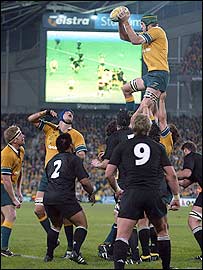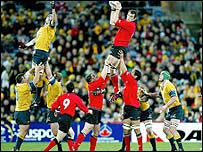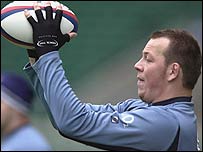Rugby - 101
The Laws of Rugby
The Basics - Scrummaging - Line-out - Ruck - Maul - Offside - Tackling
5-metre Scrum - Mark - Sin-Bin
It is a way of restarting play after the ball has been knocked or kicked out of play past the touch line.
The line-out consists of three to eight players from each side, up to 16 in total, and is taken where the ball went out of play.
The aim of each player is simply to get their hands on the ball for their team.
So how does it work? The advantage is with the team throwing in.
They get the ball because they were not the team who last touched the ball before it went out. They also get to decide how many players will make up the line-out.

The most important players are the hooker, the two second rows and scrum-half. They are responsible for getting the ball out to the backs or for the rest of the forwards.
That does not mean the other players have nothing to do. Far from it.
The line-out must be formed past the five-meter line and no more than 15m in from the touchline, and both teams must have a one meter gap between them.
If the referee decides one team has purposely closed the gap, a penalty will be awarded to the other team.

But this is not easy. The other team also want the ball, so they'll be doing all they can to upset the hooker's throw.
The hooker gets a call from one of the jumpers or the scrum half, usually in a code no-one except your team understands, on who to aim the throw at.
They must stand behind the touch line when they make their throw.
And the throw must be deadly straight, otherwise the referee will have the line-out taken again, but this time the opposition get the throw in.

- The ball must be thrown
straight
- All players not in the line-out
must be 10m behind the last man in the line
- No player can use a one of the
opposition to use as support when they are jumping
- No player is allowed to push,
charge or hold another player in the line-out
- No player can be lifted before
the ball is thrown
- No jumper can use the outside
of their arm to catch or deflect the ball
Depending on how serious the offence
is, the referee will either award a penalty or free-kick to the team who did
not make the offense.

